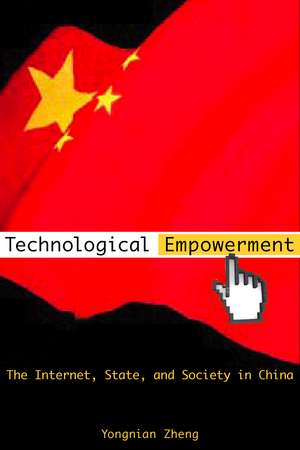Technological Empowerment: The Internet, State, and Society in China
Autor Yongnian Zhengen Limba Engleză Hardback – 6 noi 2007
Will new information technologies, especially the Internet, bring freedom and democracy to authoritarian China? This study argues that the Internet has brought about new dynamics of socio-political changes in China, and that state power and social forces are transforming in Internet-mediated public space.
Its findings are fourfold. First, the Internet empowers both the state and society. The Internet has played an important role in facilitating political liberalization, and made government more open, transparent, and accountable. Second, the Internet produces enormous effects which are highly decentralized and beyond the reach of state power. Third, the Internet has created a new infrastructure for the state and society in their engagement with (and disengagement from) each other. Fourth, the Internet produces a recursive relationship between state and society. The interactions between the state and society over the Internet end up reshaping both the state and society.
Its findings are fourfold. First, the Internet empowers both the state and society. The Internet has played an important role in facilitating political liberalization, and made government more open, transparent, and accountable. Second, the Internet produces enormous effects which are highly decentralized and beyond the reach of state power. Third, the Internet has created a new infrastructure for the state and society in their engagement with (and disengagement from) each other. Fourth, the Internet produces a recursive relationship between state and society. The interactions between the state and society over the Internet end up reshaping both the state and society.
Preț: 447.38 lei
Preț vechi: 552.33 lei
-19% Nou
Puncte Express: 671
Preț estimativ în valută:
85.62€ • 89.27$ • 71.16£
85.62€ • 89.27$ • 71.16£
Carte tipărită la comandă
Livrare economică 20 martie-03 aprilie
Preluare comenzi: 021 569.72.76
Specificații
ISBN-13: 9780804757379
ISBN-10: 0804757372
Pagini: 272
Dimensiuni: 152 x 229 x 20 mm
Greutate: 0.5 kg
Editura: Stanford University Press
Colecția Stanford University Press
ISBN-10: 0804757372
Pagini: 272
Dimensiuni: 152 x 229 x 20 mm
Greutate: 0.5 kg
Editura: Stanford University Press
Colecția Stanford University Press
Recenzii
"As a China expert, Zheng's superior knowledge on China allows him to execute an insightful and balanced analysis of the Internet's impacts on the state-society relations in China . . . Overall, this is a truly well-researched and well-written book. Zheng has successfully provided a conceptual framework to assist our understanding of the political impact of the Internet in China. This book is a must-read for those scholars studying contemporary China. It is useful for relevant graduate courses in the fields of political science, sociology, and business."—Sheng Ding, Journal of Chinese Political Science
"By reviewing the impact of information technology on political development in China, Zheng seeks to explore the dynamics of socio-political changes brought about by the Internet, the transformation of state power and social forces in Internet-mediated public space, and how the Internet provides an arena for the mutual empowerment of the state and society . . . Highly recommended."—S. K. Ma, Choice
"Technological Empowerment is a great contribution to the study of information technology in China. Zheng provides not only a thorough analysis of the origin of the nation-building framework, but also case studies of interactions between the state and society that are facilitated through information technology." —Technology in Culture
Notă biografică
Yongnian Zheng is Professor and Head of Research at The China Policy Institute, Nottingham University. He is also a coeditor of China: An International Journal. His publications include Globalization and State Transformation in China (2004) and Will China Become Democratic? Elite, Class, and Regime Transition (2004).
Descriere
Will new technologies, especially the Internet, bring freedom and democracy to authoritarian China? This book argues that the internet has brought new dynamics of sociopolitical change in China, not always supportive of democracy.
















